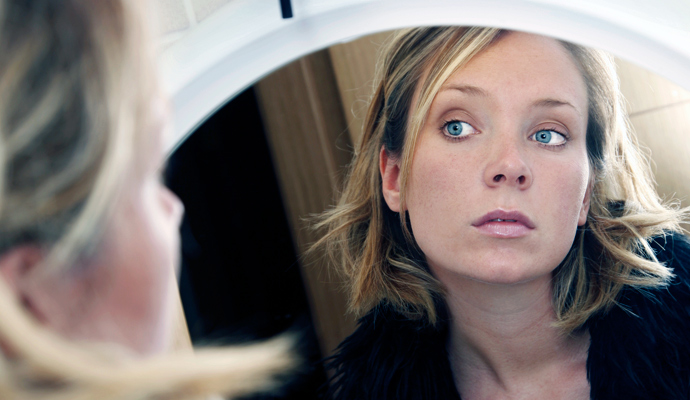How to be optimistic, according to science
It turns out many of the common methods for becoming more positive are bunk

A free daily email with the biggest news stories of the day – and the best features from TheWeek.com
You are now subscribed
Your newsletter sign-up was successful

Should you see a glass as half empty or half full? If you want to live a better life, and you care what research has to say, there's a clear answer to this question: half full.
Scientific research has come up with a long list of benefits to being optimistic. Here are just a few:
1. Optimism is associated with better health and a longer life.
The Week
Escape your echo chamber. Get the facts behind the news, plus analysis from multiple perspectives.

Sign up for The Week's Free Newsletters
From our morning news briefing to a weekly Good News Newsletter, get the best of The Week delivered directly to your inbox.
From our morning news briefing to a weekly Good News Newsletter, get the best of The Week delivered directly to your inbox.
2. Research has shown that practicing optimism and gratitude causes (not just correlates with) an increase in happiness.
3. The army teaches soldiers to be optimistic because it makes them tougher and more persistent.
4. Being socially optimistic — expecting people to like you — makes people like you more.
5. Expecting a positive outcome from negotiations made groups more likely to come to a deal and to be happy with it.
A free daily email with the biggest news stories of the day – and the best features from TheWeek.com
6. Optimists are luckier. Research shows by thinking positive they persevere and create more opportunities for themselves.
7. Optimistic salespeople are more successful.
The list goes on and on. Being optimistic is one of the 10 things I recommend you do every day and something associated with great lives.
On the flip side, UPenn professor and happiness expert Martin Seligman explains pessimism is very often a negative:
Research has revealed, predictably, that pessimism is maladaptive in most endeavors: Pessimistic life insurance agents make fewer sales attempts, are less productive and persistent, and quit more readily than optimistic agents. Pessimistic undergraduates get lower grades, relative to their SAT's and past academic record, than optimistic students… ["Countering Lawyer Unhappiness: Pessimism, Decision Latitude and the Zero-Sum Dilemma" from Cardozo Law School Jacob Burns Institute for Advanced Legal Studies]
But it turns out many of the common methods for becoming more positive are bunk. Standing in front of the mirror saying cheery things doesn't help.
Pessimists can in fact learn to be optimists, and not through mindless devices like whistling a happy tune or mouthing platitudes ("Every day, in every way, I'm getting better and better"), but by learning a new set of cognitive skills… We have found that merely repeating positive statements to yourself does not raise mood or achievement very much, if at all. [Learned Optimism]
So are we doomed if we're not naturally optimistic? Don't worry, Frodo, we'll get you back to the Shire.
Here are the four steps that can turn pessimists into optimists — or even make mildly positive people very positive.
The three P's
It all comes down to what researchers call "explanatory style." When bad things happen, what kind of story do you tell yourself?
There are three important elements here. Let's call them the Three P's: permanence, pervasiveness, and whether it's personal.
Pessimists tell themselves that bad events:
1. Will last a long time, or forever. ("I'll never get this done.")
2. Are universal. ("You can't trust any of those people.")
3. Are their own fault. ("I'm terrible at this.")
Optimists, well, they see it the exact opposite:
1. Bad things are temporary. ("That happens occasionally but it's no big deal.")
2. Bad things have a specific cause and aren't universal. ("When the weather is better that won't be a problem.")
3. It's not their fault. ("I'm good at this but today wasn't my lucky day.")
Seligman explains:
The defining characteristic of pessimists is that they tend to believe bad events will last a long time, will undermine everything they do, and are their own fault. The optimists, who are confronted with the same hard knocks of this world, think about misfortune in the opposite way. They tend to believe defeat is just a temporary setback, that its causes are confined to this one case. The optimists believe defeat is not their fault: Circumstances, bad luck, or other people brought it about. Such people are unfazed by defeat. Confronted by a bad situation, they perceive it as a challenge and try harder. [Learned Optimism]
And when good things happen, the situation reverses:
1. Pessimists think good things will be short-lived, are rare and random.
2. Optimists think good things will last forever, are universal and of their own doing.
What's the ultimate result of this? Pessimists often quit. Life feels futile. And when life feels futile, you stop trying and frequently get depressed.
So now we understand the kind of thinking that underlies these positions… but how do you go from one to the other?
Research shows you should act like a crazy person… Okay, I'll be more specific.
Argue with yourself

How do you train a puppy not to poop on the carpet? It helps to catch him in the act.
When things don't go your way, that voice in your head is going to tell a story. Check which explanatory style it's using.
Is it saying bad things are going to be permanent and universal? Are you blaming yourself? That's pessimism.
Watch your thinking and flip the script on the three:
1. Change permanent explanations to more fleeting ones.
2. Change pervasive responses to specific ones.
3. Change personal reasoning to not-all-my-fault perspectives.
This doesn't have to mean lying to yourself.
Do you really "always screw this up"? That's probably not accurate. Was it 100 percent your fault? Almost everything has multiple causes.
By remembering the Three P's and flipping the script, research shows you can make yourself more optimistic over time.
But that raises an interesting question: why would anyone ever want to be pessimistic? There's a reason.
Pessimists are more accurate... but pay a high price
Plain and simple, pessimists see the world more accurately than optimists do.
Overall, then, there is clear evidence that nondepressed people distort reality in a self-serving direction and depressed people tend to see reality accurately. [Learned Optimism]
Wow. So when negative people say happy people are "lying to themselves"… sometimes they're right.
The reason you predict your friends' behavior better than they do is we're all realistic about others' actions and too optimistic about our own.
And if you're in a job where seeing potential problems is vital and there are high costs to being wrong, pessimism can help you.
…judiciously employed, mild pessimism has its uses…. The company also needs its pessimists, the people who have an accurate knowledge of present realities. They must make sure grim reality continually intrudes upon the optimists. The treasurer, the CPAs, the financial vice-president, the business administrators, the safety engineers — all these need an accurate sense of how much the company can afford, and of danger. Their role is to caution, their banner is the yellow flag. [Learned Optimism]
Pessimistic entrepreneurs are more likely to succeed. Optimistic gamblers lose more money. The best lawyers are pessimists.
In his book Authentic Happiness, Seligman explains:
Pessimism is seen as a plus among lawyers… The ability to anticipate the whole range of problems and betrayals that non-lawyers are blind to is highly adaptive for the practicing lawyer who can, by so doing, help his clients defend against these far-fetched eventualities. [Authentic Happiness]
But while it makes lawyers better at their job, it comes at a high price.
Guess why lawyers are 3.6 times more likely to suffer from depression and more likely to end up divorced?
While seeing bad things as potentially pervasive and permanent helps them do their job, it also carries over to their personal life:
The ability to anticipate the whole range of problems and betrayals that non-lawyers are blind to is highly adaptive for the practicing lawyer who can, by so doing, help his clients defend against these far-fetched eventualities. If you don't have this prudence to begin with, law school will seek to teach it to you. Unfortunately, though, a trait that makes you good at your profession does not always make you a happy human being. [Authentic Happiness]
Excuse the pun, but there is an upside to pessimism. So when should you be optimistic and when should you be pessimistic?
Ask yourself: "What's the cost of being wrong here?"

If I'm up for double murder I want a pessimistic attorney looking for all the problems in my case.
The engineer designing my car better be a rampant pessimist — his mind eagerly identifying every imaginable point of failure.
But do I want to walk around all day imagining the worst that could possibly happen? No way.
Whenever you're unsure if optimism is the right way to handle something ask yourself: "What's the cost of being wrong here?"
The fundamental guideline for not deploying optimism is to ask what the cost of failure is in the particular situation. If the cost of failure is high, optimism is the wrong strategy. The pilot in the cockpit deciding whether to de-ice the plane one more time, the partygoer deciding whether to drive home after drinking, the frustrated spouse deciding whether to start an affair that, should it come to light, would break up the marriage should not use optimism. Here the costs of failure are, respectively, death, an auto accident, and a divorce. Using techniques that minimize those costs is inappropriate. On the other hand, if the cost of failure is low, use optimism. [Learned Optimism]
Seligman calls this balance "flexible optimism."
Pessimism is a tool. Have it in the garage like a snowblower. You don't need it every day but occasionally it's valuable to have around.
So how do we tie all this together?
Sum up
Want to be more positive? When problems arise, dispute negative thoughts by making sure your explanations are:
1. Transitory, not permanent.
2. Specific, not pervasive.
3. And the causes are external, not "all-my-fault."
Pessimism can be a useful tool when the downside is big, but used as your default it makes life feel futile and hopeless.
And what does research say predicts achievement better than intelligence, grades, or personality?
There's a reason pessimism brings us down: human nature is designed to hope and strive, not to be fearful and defensive.
Yes, pessimism might be slightly more accurate — but it's no way to live a life.
Join over 90,000 readers and get a free weekly update via email here.
More from Barking Up The Wrong Tree...
-
 Film reviews: ‘Wuthering Heights,’ ‘Good Luck, Have Fun, Don’t Die,’ and ‘Sirat’
Film reviews: ‘Wuthering Heights,’ ‘Good Luck, Have Fun, Don’t Die,’ and ‘Sirat’Feature An inconvenient love torments a would-be couple, a gonzo time traveler seeks to save humanity from AI, and a father’s desperate search goes deeply sideways
-
 Political cartoons for February 16
Political cartoons for February 16Cartoons Monday’s political cartoons include President's Day, a valentine from the Epstein files, and more
-
 Regent Hong Kong: a tranquil haven with a prime waterfront spot
Regent Hong Kong: a tranquil haven with a prime waterfront spotThe Week Recommends The trendy hotel recently underwent an extensive two-year revamp